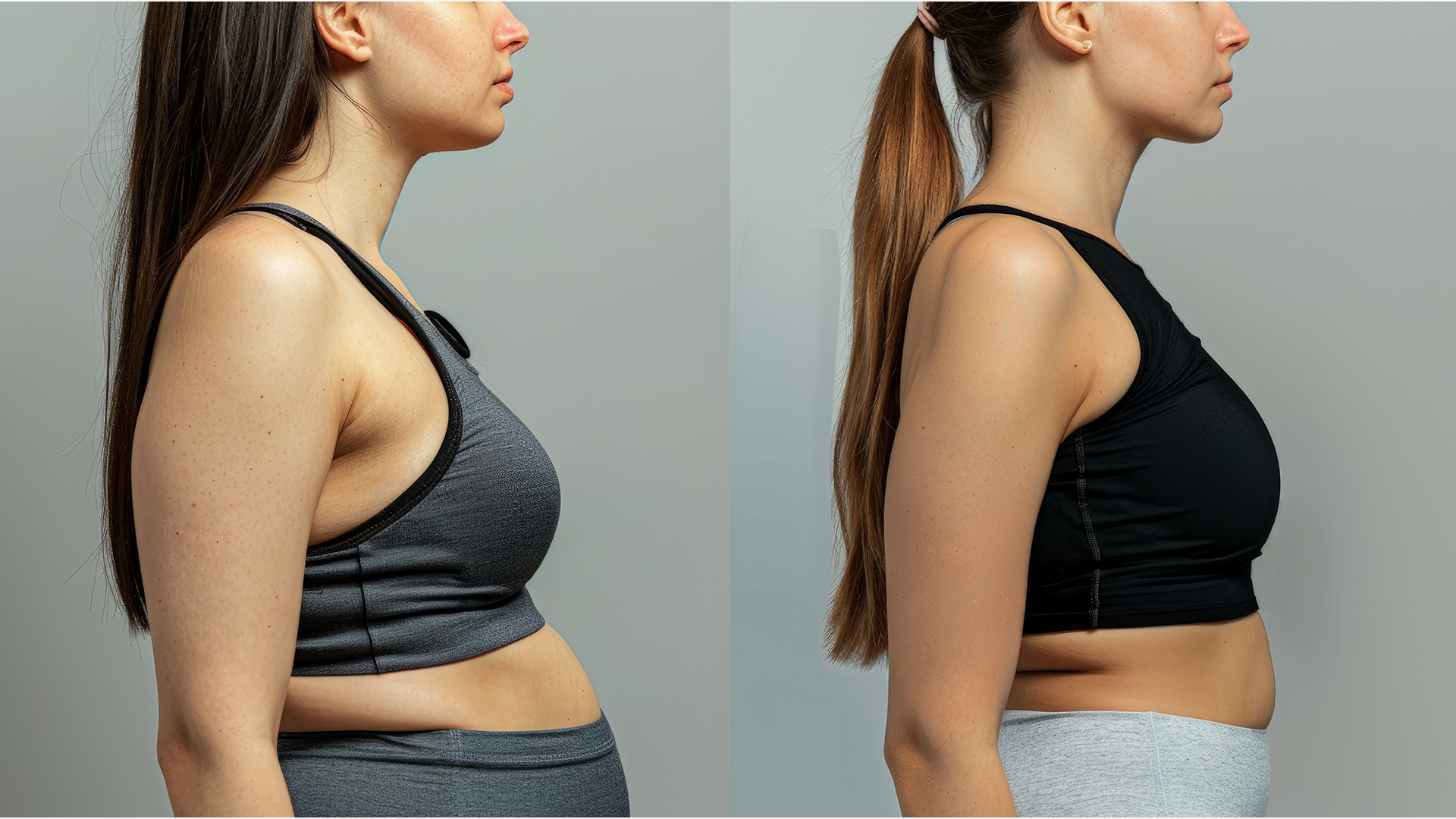There’s no doubt that living with polycystic ovary syndrome (PCOS) is tough.
PCOS affects approximately 1 in 10 women of reproductive age, making it one of the most common hormonal disorders in women, regardless of ethnicity or race.
From fertility struggles to weight gain, unwanted hair growth, and its unfortunate impact on mental health, PCOS is a difficult path to navigate.
But it's not impossible.
There are plenty of ways to tackle this tricky disorder head-on—and we're going to cover them in this guide.
Whether you're reading for yourself or a loved one, rest assured we're going to dive into all things PCOS, to give you helpful ways of managing PCOS symptoms, safe weight loss tips, and actionable tips for diet, and exercise to help you grab life by the horns.
After all, life is for living and PCOS doesn’t get to make all the decisions.
What is PCOS?
PCOS is an endocrine disorder that affects millions of women and girls of reproductive age across the world.
It's essentially a hormone disorder, and when hormone levels are disrupted, the knock-on effect on bodily processes such as stress levels, weight, hunger, and how our bodies use food can be huge—not to mention difficult to manage.
It’s a condition characterized by various symptoms, including irregular periods, ovarian cysts, hormonal imbalances, and weight gain. Weight management can be particularly challenging if you have PCOS.

PCOS happens due to an excessive amount of male hormones called androgens, which disrupt normal ovulation and hormone levels. They hamper menstrual cycles and the ability for women to get pregnant. No one knows why this happens or what causes it.
There are some factors like insulin resistance and genetics that make individuals at higher risk of PCOS.
What are Common PCOS Symptoms?
While there are some commonly experienced symptoms of women with PCOS, not everyone experiences them.
They do, however, range in severity. Let’s take a look at the common symptoms of PCOS:
- Irregular periods
- Heavy bleeding during periods
- Stopped periods
- Infertility
- Abnormal hair growth and excess hair growth
- Oily skin and acne
- Weight gain, especially belly fat
- Insulin resistance or type 2 diabetes
- High blood pressure
It's worth noting some symptoms like acne and weight gain can be caused by other factors, not just PCOS.
If you’re experiencing any of these symptoms, it's best to talk to a healthcare provider for proper diagnosis and treatment.
Facts about PCOS
Let's take a look at some facts about PCOS that you might not already know.
Did you know?
- PCOS is a leading cause of infertility among women, with up to 70% of women with PCOS experiencing fertility problems.
- PCOS increases the risk of cardiovascular disease, high cholesterol, and type 2 diabetes, though it doesn't mean everyone with PCOS will develop them.
- Women with PCOS are also at a higher risk of developing mental health issues like anxiety and depression. Being aware and being kind is important.
- Insulin resistance is the key part of PCOS because when the body's cells have a reduced response to insulin, higher levels of insulin enter the blood and more androgens are produced, disrupting further the hormonal imbalance.
- Sleep apnea and PCOS have been linked with studies showing a higher frequency of obstructive sleep apnea (OSA) with those with PCOS.
But wait, there are positives.
Did you also know?
- Studies suggest that PCOS symptoms can be positively affected by lifestyle changes such as a healthy diet with plenty of healthy fats, whole grains, and regular exercise.
- Sometimes, medication can be prescribed to help with the hormone imbalances some people with PCOS experience.
- There are various groups, charities and organizations that can help support you with PCOS. Whether it's joining social media pages, volunteering, heading to events or donating, you can unite with others who share the same condition and drive positive change together.
Helpful PCOS resources
Discussion groups:
Organizations and charities:
Why it’s Harder to Lose Weight with PCOS
It's true that weight gain is common for those with PCOS and weight loss isn't a case of just calorie counting, either.
People with PCOS can suffer from low self-esteem and body image issues because it’s harder to lose weight with PCOS.

(But don't worry, in the next section, we'll give you tips on how to lose weight and weight maintenance because it is possible.)
Here's why it's harder to shift the pounds with PCOS:
Insulin resistance
This is a big one.
Many women with PCOS have issues with insulin and resistance, which means their cells aren't able to effectively convert glucose to energy. The result of this is fat storage and high blood sugar levels. This means shedding excess pounds can involve more effort than someone without PCOS.
Hormonal imbalances
As we know, with overproduction, hormone imbalances follow. Why do hormones contribute to stubborn fat? Well, because hormones play a key role in regulating metabolism, fat storage and appetite, you can see why losing weight can be a challenge.
Androgens can also cause an increase in appetite, and affect fat metabolism.
Inflammation
Those with PCOS have higher levels of inflammation, which can lead to more hunger pangs, a reduction in insulin sensitivity and more inflammation in the body. All these aspects contribute to difficulty losing weight.
Stress
High stress levels result in the overproduction of the hormone cortisol and may lead to an increase in blood glucose levels, in turn leading to insulin resistance.
Stress also increases inflammation making losing weight even more challenging.
How Can I Lose Weight with PCOS
Okay, here's the good news.
There are plenty of things you can do to lessen the symptoms of PCOS and to get started on your weight loss journey.
Let's talk about diet and exercise.
What Diet is Best for Weight Loss With PCOS?
You’ve heard it before but a balanced diet is so important for individuals with PCOS because it helps regulate insulin levels, manage weight, and improve hormonal balance.
Did you know? Research has shown that a low glycemic index (GI) diet, which includes foods that release glucose slowly into the bloodstream, can be beneficial for women with PCOS.

A diet like this helps reduce impaired insulin sensitivity and insulin sensitivity—a double win.
So, changing your eating habits and forming your own PCOS diet can help you get on the right road for weight loss—but what does this diet look like?
A Low Glycemic Index Diet Example Meal Plan: One Day
Foods like low-sugar fruits, nuts and seeds, whole grains, lean proteins, healthy fats and non-starchy vegetables help with hormone regulation.
Blood sugar levels can become more stable with more healthy fats like salmon and avocado alongside protein and improve insulin resistance.
Breakfast
Scrambled eggs with spinach and mushrooms, topped with avocado slices and served with a slice of whole grain bread.
Mid-morning snack
Apple slices with almond butter.
Lunch
Grilled chicken breast with a side salad made of mixed greens, cherry tomatoes, and cucumber slices, dressed with olive oil and lemon juice.
Afternoon snack
Carrot sticks with hummus.
Dinner
Baked salmon with roasted asparagus and a small serving of brown rice.
Evening snack
A handful of mixed berries.
Which Foods Should I Avoid With PCOS?
Let's start by saying you don't need to totally cut out these foods. But limiting them is definitely the right approach when you have PCOS.
Taking on a healthy lifestyle and nutritious diet is a great way to know.
So, which foods should you eat as a treat?
Saturated Fats
Things like steaks, hamburgers (all red meat, in fact), butter and French fries should be limited as they add to inflammation in the body.
Processed Snacks
As you know, things like pies, cakes, candies and cookies have a high amount of sugar in them and unhealthy fats and are best to avoid.

Refined Carbohydrates
Refined flours and sugars can really impact insulin resistance and make it worse.
To minimize insulin resistance and any blood sugar spikes avoid sugary cereals, white bread, white rice, refined flour and refined sugar.
Sugary Drinks
You should aim to cut down on fruit juices, sodas and sugary drinks as they lead to negative impacts on blood sugar levels.
Can I Eat Highly Processed Foods With PCOS?
It's recommended to avoid highly processed foods if you have PCOS.
As we've seen, candies, cookies, sodas, and cakes contain unhealthy fats, refined grains and are high in added sugars. Such foods can lead to worse levels of insulin resistance and also cause a fast spike in blood sugar levels—not to mention being high in calories.
Concentrate on a low glycemic diet, which gives more fiber and nutrients that help in stabilising blood sugar levels.
Does a Low-Carb Diet Work for PCOS?
This diet can be successful in managing a PCOS.
With this type of diet, research shows that low-carbohydrate diets to help treat PCOS may aid in weight loss and reduce hyperinsulinemia, in turn improving insulin sensitivity.
Plus, research has shown positive benefits with reference to a low-carb diet and PCOS, including weight loss and improved insulin sensitivity.

In one pilot study, women with PCOS following a low-carb diet experienced weight loss and insulin improvements over a six-month period.
Another study demonstrated that a low-carb diet resulted in weight loss and favorable changes in hormonal and metabolic measurements in overweight women with PCOS.
Encouraging, right?
Can a Ketogenic Diet Work for PCOS?
A ketogenic diet, also known as "The Keto Diet", is a low-carb, high-fat diet that means those following it consume a limited amount of carbs and increase the amount of fats you eat, that reduction is replaced by fat.
The main goal is to change the body's metabolism into ‘ketosis’ where ketones from fat are the main source of energy. Fat consumption is increased and carb consumption is highly reduced.
Does a High-Fiber Diet Work for PCOS?
A high-fiber diet can be beneficial for individuals with PCOS.
Fiber plays an important role in managing PCOS by promoting weight loss through improving insulin resistance.
Did you know? High-fiber food helps slow down the absorption of glucose, which in turn means improved insulin levels and better regulated, even stable, blood sugar levels.

And that's not all, fiber-rich foods can help promote that fullness feeling, reduce hunger pangs, and lead to easier weight management and weight loss.
Foods like vegetables, whole grains, legumes, and fruits not only give much-needed nutrients for the body, but increasing dietary fiber intake is always a good idea.
What Foods Help Curb Food Cravings for PCOS?
One study suggests that increasing protein intake while decreasing carbohydrates may help manage insulin levels, which is a beneficial dietary approach for PCOS patients.
Let’s take a look at some examples.
Eggs
These are an excellent source of protein, with one egg amounting to around six grams of protein.
Chicken and turkey
These are great lean protein sources, just make sure the chicken breast and turkey breast are skinless.
Fish
Fatty fish like trout, sardines and salmon have healthy fat like omega 3 and give you great high-quality protein.
Also fit in cruciferous vegetables, legumes and low-sugar fruits, because they reduce inflammation in the body and help stabilize blood sugar levels.
How to Exercise With PCOS
There are a range of exercises that help with both weight loss and stress when you have PCOS.
Physical activity is so important for the management of PCOS symptoms and works as a brilliant stress buster. As we know, chronic stress can exacerbate the symptoms of PCOS by increasing cortisol levels.
And when these levels are high it can lead to weight gain, as well as inflammation and irregular blood sugar levels.

We're going to suggest some exercises to tackle both issues and then give you a realistic exercise routine to try out.
Just let your healthcare provider know in advance of any changes to your diet or exercise routine.
Stress-Busting Exercises for PCOS
Several studies suggest that low-intensity exercise, such as yoga or Pilates, can effectively reduce stress in people with PCOS and also lower cortisol levels.
Getting in regular practice of nice calm exercises such as pilates and yoga can help to reduce anxiety, and depression, help regular menstrual cycles, and improve insulin resistance.
Also, getting in low to moderate exercises like gentle walking, cycling, swimming, and dancing can help reduce stress and cortisol levels. So, go on—have a little boogie.
How can you change your day?
Where can you take the stairs instead of the elevator? Can you walk or cycle to work instead of driving? It’s a lifestyle change, so small changes are easier to maintain and improve on as you go. You’ve got this.
Fat Burning Exercise for PCOS
Now for exercise options you can factor into your week to get you shedding those pounds.
Aerobic Exercise
Taking part in aerobic exercises like swimming, jogging or cycling not only help to burn fat, but also improve cardiovascular health. And, once you get your metabolism fired up, your metabolic health will improve, which is the body's ability to process and utilise energy from food.
High-Intensity Interval Training (HIIT)
HIIT workouts involve short bursts of intense exercise followed by periods of rest or lower-intensity exercise.
HIIT has been found to work well for improving insulin resistance in women and for fat burning.

Here are some tip-top examples of HIIT exercises you can try at home::
Sprint intervals
Sprint as fast as you can for 30 to 60 seconds, then rest or jog for 30 to 60 seconds. Repeat for several rounds. Then, have a glass of water.
Jump squats
Perform a squat and explode upwards into a jump. Land softly and immediately go into the next repetition. Repeat for a set number of times.
Burpees
Start in a standing position, then drop down into a push-up position, perform a push-up, jump back to the squat position, and finish with a vertical jump. Repeat for a set number of repetitions.
Strength Training Exercises For PCOS
To boost your metabolism, increase muscle mass, and help burn fat try weaving strength training exercises like bodyweight exercises and weightlifting into your workouts. The result? Fat burning at rest.
Weightlifting
Deadlifts
Put a comfortable amount of weight on your barbell, position your feet shoulder-width apart and with a neutral sponge, hinge at the hips and lift the weight, engaging your glutes, hamstrings, and upper back.
Bench press
Lie back on the bench, grip the bar just outside shoulder-width, and lower it to your chest, keeping your elbows at a 45-degree angle. Explode upwards to engage your chest, shoulders, and triceps.

Squats
Load that barbell onto your shoulders, keep your chest up, and descend into a deep squat, engaging your quads, glutes, and core. Then, rise with authority, harnessing the power within your legs.
Sleep hygiene
Okay. It's not an exercise or diet tip, but getting good, restful sleep each night is important when it comes to PCOS.
When you have short, broken or unrestful sleep you can experience imbalances in hormones, making your symptoms worse. Aim for getting seven to eight hours of sleep a night, ideally.
How to Maintain a Healthy Weight with PCOS
It’s definitely possible to maintain a healthy weight with PCOS.
We've already discussed how a balanced diet with a reduction of carbs, and an increase in fiber and protein can help you get started.
This information, armed with regular and varied exercise, is a great place to start.
Here are some more hints to help you on your way.
Control portion sizes
Be mindful of your portion sizes and avoid overeating. Use side plates and smaller bowls to assist you in portion control.
Stay hydrated
It's so important to drink enough water during the day.

Ensure you drink at least eight cups of water a day as not only is it great for your skin and keeps you cool and feeling good, it'll stop you from overeating and help to manage your cravings.
Join forces
As well as being more fun, joining forces with a friend or your partner so these healthy lifestyle changes can be exacted in a team-like scenario. You can help motivate and encourage each other.
Manage your stress levels
Of course, exercise helps with this and it’s a great way to help people with PCOS manage their stress levels. But other options like mindfulness techniques and guided meditation can help keep you level.
How Can PhenQ Help?
Okay.
You've got your diet of nutritious foods and exercise plans locked down. You've even got a friend on board. So with all that effort you're putting in, why not have a little helping hand?
Try PhenQ—the only weight loss supplement you need to succeed.
PhenQ is a natural weight management system that targets five key areas of metabolic health to help shed excess fat, crush cravings, and support natural energy.
It combines the power of multiple weight loss supplements into one, easy-to-use pill to help you burn fat, block new fat cells and boost your energy.
Start blocking fat production, boosting energy levels, burning fat, suppressing your appetite and elevating your mood today, because PCOS doesn't get to live your life for you. We’ll say it again—you’ve got this.



